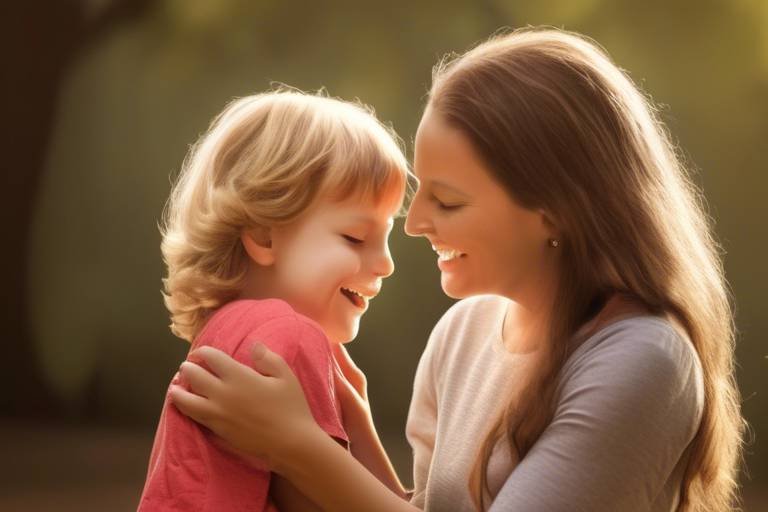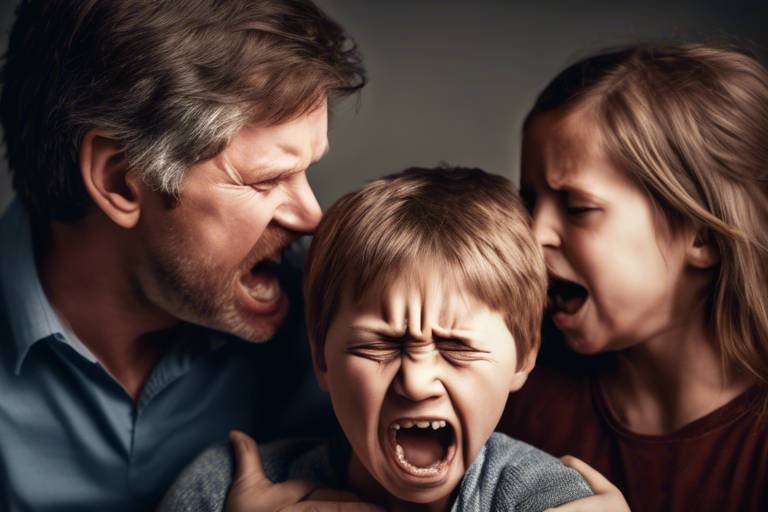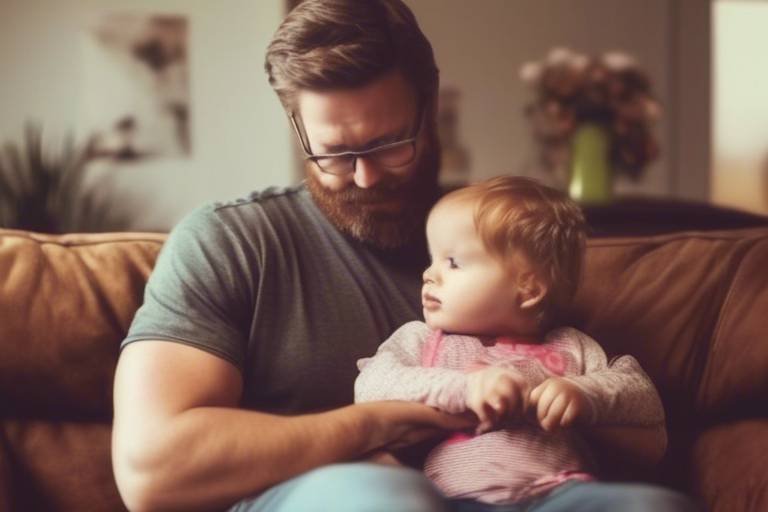Technology and Role-Playing Games: Are They Good for Kids?
In today’s digital age, the intersection of technology and role-playing games (RPGs) has sparked a lively debate among parents, educators, and gamers. Are these immersive games beneficial for our children, or do they pose risks that outweigh their advantages? As we dive into this topic, it’s essential to consider both sides of the coin. On one hand, RPGs can be a gateway to creativity, social skills, and problem-solving. On the other hand, concerns about screen time, content appropriateness, and physical activity levels loom large. So, let’s unpack this complex relationship and explore whether RPGs are a boon or a bane for kids.
Role-playing games can significantly enhance a child's creativity and problem-solving skills. Imagine a child stepping into the shoes of a brave knight or a cunning wizard, navigating through intricate storylines and challenges. This kind of imaginative play fosters not only creativity but also critical thinking as children are often required to devise strategies to overcome obstacles. Through interactive storytelling and character development, RPGs encourage kids to think outside the box and approach problems from various angles.
One of the most remarkable aspects of RPGs is their ability to cultivate essential social skills. When children engage in these games, they often find themselves collaborating with peers to achieve common goals. Whether they are embarking on a quest to defeat a dragon or solving a mystery, teamwork and communication become vital components of the gaming experience. This collaboration can lead to meaningful friendships and a sense of belonging, as children share experiences and support one another in their gaming adventures.
RPGs provide a unique platform for children to connect with others, often leading to friendships that extend beyond the game. These connections can create a supportive community among players, where they can share tips, strategies, and experiences. The bonds formed in these virtual worlds can be incredibly strong, offering children a sense of camaraderie that is often hard to find in traditional settings. Just like a band of adventurers united for a common cause, these friendships can flourish and provide emotional support.
When discussing the social aspects of RPGs, it’s crucial to explore the differences between online gaming communities and in-person interactions. Online games can offer a diverse range of players from various backgrounds, enriching the gaming experience. However, in-person gaming sessions, such as tabletop RPGs, can enhance face-to-face communication skills and foster deeper connections. Both forms of interaction have their unique benefits and contribute to a child's social development in different ways.
Engaging in role-playing scenarios allows children to navigate conflicts within the game, teaching them valuable lessons about negotiation and compromise in real life. When players disagree on strategies or character decisions, they must communicate effectively and find common ground. This practice can translate into real-world situations, equipping children with the tools they need to resolve conflicts amicably.
RPGs often require players to step into different characters' shoes, promoting empathy and understanding of diverse viewpoints. By experiencing the world through various characters, children learn to appreciate different perspectives, which can enhance their interpersonal skills and emotional intelligence. This ability to empathize can lead to more compassionate interactions in real life, as children become more attuned to the feelings and experiences of those around them.
While RPGs offer numerous benefits, it’s essential to consider the potential risks. Concerns about excessive screen time, exposure to inappropriate content, and the impact on physical activity levels are valid and should not be overlooked. It’s crucial for parents and guardians to be aware of these risks and take proactive measures to ensure a balanced approach to gaming.
Prolonged screen time associated with gaming can have implications for children's health and well-being. Parents should aim to balance gaming with other activities to promote a healthy lifestyle. Setting limits on screen time, encouraging outdoor play, and engaging in family activities can help mitigate the risks associated with excessive gaming.
Not all RPGs are suitable for children, making it essential for parents to monitor game content. Parental guidance is crucial in ensuring that children engage with age-appropriate games. By researching games and discussing content with their children, parents can help them make informed choices that align with their values and comfort levels.
- Are RPGs suitable for all age groups? - Not all RPGs are appropriate for every age group. It's important to review game content and ratings.
- How can parents monitor their child's gaming? - Parents can set limits, engage in discussions about the games, and play together to understand the content.
- Can RPGs improve academic skills? - Yes, RPGs can enhance critical thinking, creativity, and even literacy through storytelling.
The Benefits of RPGs for Kids
This article explores the intersection of technology and role-playing games (RPGs), examining their potential benefits and drawbacks for children in today’s digital age.
Role-playing games (RPGs) might just be the secret ingredient to unlocking a child's creativity and problem-solving skills. Imagine a world where kids can step into the shoes of a brave knight, a clever wizard, or even a cunning rogue. This immersive experience not only enhances their imaginative play but also fosters critical thinking. As they navigate complex storylines and develop their characters, children learn to make decisions that can affect the outcome of the game. This aspect of RPGs encourages them to think on their feet, evaluate different scenarios, and come up with innovative solutions to problems they encounter.
Moreover, RPGs often involve rich storytelling that captivates the players’ attention. This narrative-driven gameplay allows children to engage deeply with the material, prompting them to ask questions, predict outcomes, and even create their own stories. As they weave their characters' backstories and motivations, they are not just playing a game; they are honing their creative writing skills and expanding their vocabulary. The interactive nature of RPGs makes learning feel less like a chore and more like an adventure.
In addition to boosting creativity, RPGs can significantly enhance a child's social skills. Most RPGs require teamwork, which means players must communicate effectively to achieve common goals. Whether it’s strategizing to defeat a powerful dragon or collaborating to solve a tricky puzzle, children learn the importance of working together. They develop essential skills such as negotiation, leadership, and active listening—all while having fun! It's like a real-life lesson in cooperation, but with the added excitement of fantasy worlds and epic quests.
Another exciting benefit of RPGs is their ability to facilitate friendships. Many children find their closest friends through gaming. These shared experiences create bonds that can extend beyond the screen. Whether they are discussing game strategies or planning their next adventure, kids form a supportive community that encourages social interaction. The friendships forged in the gaming world often lead to meaningful connections in real life, helping children develop a sense of belonging.
Interestingly, RPGs also promote empathy and perspective-taking. When children play as different characters, they are challenged to understand and embody perspectives that are not their own. This can be a powerful tool for teaching them about diversity and compassion. For instance, a child may play a character who faces challenges different from their own life experiences. This can foster a greater understanding of others' feelings and situations, which is crucial in developing emotional intelligence and social awareness.
In summary, RPGs can be a fantastic way for children to enhance their creativity, improve social skills, and develop empathy. They provide a rich, interactive environment where learning happens naturally through play. As technology continues to evolve, it’s essential to recognize the potential benefits of RPGs in nurturing well-rounded, socially adept, and imaginative children.
While RPGs have many benefits, there are potential risks to consider, including excessive screen time, exposure to inappropriate content, and the impact on physical activity levels.
Discussing the implications of prolonged screen time associated with gaming, and how parents can balance gaming with other activities to ensure a healthy lifestyle.
The importance of monitoring game content is crucial, as not all RPGs are suitable for children, necessitating parental guidance to ensure age-appropriate choices.
- Are RPGs safe for children? - Yes, but parental supervision is recommended to ensure age-appropriate content.
- How can RPGs enhance creativity? - RPGs encourage imaginative play and critical thinking through interactive storytelling.
- Can RPGs help with social skills? - Absolutely! They promote teamwork, communication, and conflict resolution.
- What should parents look for in RPGs? - Parents should check for age ratings and content appropriateness to ensure the game aligns with their values.
Social Skills Development
Role-playing games (RPGs) are not just about slaying dragons or completing quests; they are also powerful tools for in children. When kids engage in RPGs, they often find themselves in situations that require them to work together, communicate effectively, and think critically. Imagine a group of young adventurers navigating a treacherous dungeon. Each player must contribute their unique skills and ideas to overcome challenges, which fosters a sense of teamwork that is invaluable in real life.
Collaboration is at the heart of RPGs. Players must negotiate roles, share resources, and strategize together to achieve their objectives. This dynamic teaches children how to express their thoughts clearly and listen to others, enhancing their communication skills. Furthermore, when kids encounter conflicts—be it a disagreement over strategy or an unexpected in-game event—they learn to resolve these issues through discussion and compromise, mirroring real-world interactions.
RPGs create a unique environment where friendships can flourish. Many children form lasting relationships with their gaming peers, as they bond over shared experiences and challenges faced in the game. These friendships often extend beyond the digital realm, leading to real-life connections that provide emotional support and camaraderie. Think of it as a modern-day version of a clubhouse, where kids gather not just to play but to share their lives, dreams, and challenges.
It's important to note the differences between online gaming communities and in-person interactions. Online RPGs allow children to connect with peers from different backgrounds and locations, broadening their social horizons. However, in-person gaming sessions, such as tabletop RPGs, enhance face-to-face communication skills, enabling kids to read body language and engage in non-verbal cues. Both forms of interaction contribute to social development in distinct ways, and finding a balance between the two can be beneficial.
Engaging in role-playing scenarios often places children in situations where they must navigate conflicts. For instance, if two players want to take the lead in a mission, they must discuss their viewpoints and come to a resolution. This process teaches kids valuable lessons about negotiation and compromise, skills that are essential in everyday life. By practicing these skills in a safe and controlled environment, children can gain the confidence to handle real-life conflicts more effectively.
Another significant aspect of RPGs is their ability to promote empathy. When players assume the roles of different characters, they are invited to step into someone else's shoes, experiencing the world from that character's perspective. This practice encourages children to understand and appreciate diverse viewpoints. It’s like reading a book where the reader becomes part of the story, allowing them to feel the emotions and motivations of others. Such experiences can translate into real-world interactions, fostering kindness and understanding among peers.
In summary, RPGs are more than just entertainment; they serve as a platform for . By engaging in collaborative play, children learn essential skills that will benefit them throughout their lives. From building friendships to resolving conflicts and developing empathy, the lessons learned in the realm of RPGs are invaluable. As parents and guardians, recognizing the social benefits of these games can help guide children toward positive gaming experiences.
- Are RPGs suitable for all age groups? - While many RPGs are designed for older children and teens, there are age-appropriate options for younger kids as well. Always check the content ratings.
- How can parents monitor their child's gaming? - Parents can set time limits, participate in gaming sessions, and discuss the content of the games with their children to ensure a healthy balance.
- Do RPGs promote violence in children? - Most RPGs focus on storytelling and problem-solving rather than violence. It's essential to choose games that align with your values and expectations.
Building Friendships Through Gaming
When it comes to role-playing games (RPGs), one of the most delightful surprises is how they can act as a bridge, connecting children from diverse backgrounds and locations. Imagine your child sitting in their room, headset on, immersed in a fantastical world where they are not just playing a character but also forming lasting friendships with fellow adventurers. These connections often blossom into something more than just in-game alliances; they can lead to real-life friendships that extend beyond the screen. It's like discovering a hidden treasure chest filled with camaraderie and shared experiences.
As children engage in RPGs, they find themselves working together to tackle challenges, solve puzzles, and embark on epic quests. This teamwork fosters a sense of community, where players feel a shared responsibility for one another. They learn to rely on each other, strategize together, and celebrate victories as a group. For kids who may struggle with social skills in traditional settings, RPGs provide a safe environment to practice and enhance these abilities. It's like a sandbox where they can learn the art of collaboration without the pressure of face-to-face interactions.
Moreover, the digital nature of these games allows children to connect with peers who share similar interests, regardless of geographical boundaries. Through voice chats and online forums, they can discuss strategies, share tips, and even vent about in-game frustrations. This constant interaction not only helps in building friendships but also teaches children how to communicate effectively. They learn to express their thoughts, listen to others, and negotiate their ideas—all essential skills for forming strong relationships.
However, it's important to recognize that while these friendships can be incredibly enriching, they also require a balance. Parents should encourage their children to maintain a healthy mix of online and offline interactions. Just like in a well-structured RPG, where characters need to explore different terrains, kids should also experience the world outside their screens. Engaging in physical activities, attending social events, and spending time with family are all vital components of a well-rounded social life.
In conclusion, RPGs serve as a powerful tool for children to build friendships that can last a lifetime. They create a unique space where kids can bond over shared experiences, learn valuable social skills, and develop a sense of belonging. So, the next time you see your child engrossed in a game, remember that they might just be crafting friendships that will carry into their future.
- Are RPGs safe for children? Yes, as long as parents monitor the content and ensure age-appropriate games are chosen.
- How can parents encourage healthy gaming habits? Set time limits, encourage breaks, and promote a balance with physical activities.
- Can online friendships be as meaningful as in-person ones? Absolutely! Many online friendships can be just as deep and fulfilling as those formed in person.
Online vs. In-Person Interactions
When it comes to role-playing games (RPGs), the way children interact with their peers can vary significantly based on whether they are playing online or in person. Both formats offer unique experiences that can contribute to a child's social development, yet they come with their own sets of advantages and challenges. Online interactions provide a platform for children to connect with others from different backgrounds and locations, broadening their horizons and exposing them to diverse perspectives. For instance, a child playing an RPG online might team up with friends from different countries, learning about various cultures while working towards a common goal. This can be incredibly enriching, as it encourages children to communicate effectively and adapt their strategies to fit the dynamics of a virtual team.
On the other hand, in-person interactions during RPG sessions can foster a different kind of camaraderie. When children gather around a table, rolling dice and sharing snacks, they engage in a tactile experience that enhances their connection with one another. The non-verbal cues—like laughter, eye contact, and shared excitement—create a sense of community that can be deeply fulfilling. In-person gaming often leads to spontaneous discussions and brainstorming sessions, where ideas flow more freely, allowing for a richer storytelling experience. This face-to-face interaction can also help children develop essential social skills, such as reading body language and understanding social cues, which are crucial in real-life scenarios.
However, it's important to consider the potential downsides of each interaction style. Online gaming can sometimes lead to feelings of isolation, as children may become engrossed in their screens, neglecting real-world relationships. Conversely, in-person gaming requires physical presence and scheduling, which can be challenging for busy families. To strike a balance, parents can encourage their children to engage in both online and in-person RPG experiences, allowing them to reap the benefits of each. By promoting a mix of interactions, children can develop a well-rounded social skill set that prepares them for various social situations.
Ultimately, whether online or in-person, the key is to ensure that children are engaging in healthy gaming practices. Parents should monitor their children's gaming habits, encouraging them to take breaks and engage in other activities, such as sports or arts, to maintain a balanced lifestyle. By fostering a supportive environment for both online and in-person interactions, parents can help their children develop meaningful friendships and social skills that will last a lifetime.
- Are RPGs safe for children? - While RPGs can be safe, it's essential for parents to monitor the content and ensure age-appropriate choices.
- How can I encourage my child to play RPGs? - Introduce them to games that suit their interests and play together to create shared experiences.
- What are some signs of excessive gaming? - Look for signs like neglecting responsibilities, decreased physical activity, and withdrawal from social interactions.
- Can RPGs help with academic skills? - Yes! RPGs can enhance critical thinking, creativity, and problem-solving skills, which are beneficial in school.
Conflict Resolution Skills
Engaging in role-playing games (RPGs) is not just about rolling dice or completing quests; it’s also a powerful way for children to develop . In the heat of a game, players often face dilemmas that require them to make tough choices, negotiate with others, and find compromises. Imagine a group of friends trying to decide which direction to take in a quest. Each player may have a different idea about how to proceed, leading to potential disagreements. However, this is where the magic of RPGs comes into play!
When children are immersed in these scenarios, they learn to articulate their thoughts and listen to others, which is crucial in resolving conflicts. They practice negotiation techniques as they discuss strategies and work together to overcome challenges. By navigating these interactions, kids gain insights into differing perspectives and the importance of finding common ground. It’s like a mini-laboratory for social skills, where they can experiment with different approaches to resolving disputes without the real-world stakes.
Moreover, role-playing games often present moral dilemmas that require players to weigh their options carefully. For instance, if a character must choose between saving a friend or completing a mission, the player must consider the implications of their choice. This kind of decision-making fosters critical thinking and encourages children to reflect on the consequences of their actions, both in the game and in real life.
To illustrate how RPGs can facilitate conflict resolution, let’s consider a simple breakdown of the process:
| Step | Description |
|---|---|
| 1. Identify the Conflict | Players recognize that a disagreement has occurred, whether it's about strategy, character choices, or resource allocation. |
| 2. Communicate | Open dialogue is encouraged, allowing players to express their viewpoints and feelings about the situation. |
| 3. Explore Solutions | Players brainstorm possible resolutions, weighing the pros and cons of each option. |
| 4. Reach an Agreement | Through discussion, players find a compromise that satisfies everyone involved, strengthening their teamwork. |
In essence, RPGs provide a unique platform for children to practice and refine their conflict resolution skills. As they engage in these virtual worlds, they learn that conflicts are not just obstacles but opportunities for growth and collaboration. These experiences can translate into real-life situations, equipping them with the tools they need to navigate challenges in school, at home, and in their future relationships.
Encouraging Empathy and Perspective-Taking
Role-playing games (RPGs) are not just about rolling dice and slaying dragons; they are a powerful medium for fostering empathy and perspective-taking in children. When kids dive into the world of RPGs, they often find themselves stepping into the shoes of characters who are vastly different from themselves. This immersive experience allows them to explore various backgrounds, emotions, and motivations, which can be eye-opening. Imagine a child playing as a wise old wizard, a fierce warrior, or even a misunderstood villain. Each character presents a unique story that helps players understand that everyone has their own struggles and triumphs.
In RPGs, players frequently face moral dilemmas and complex situations that require them to consider the feelings and viewpoints of others. For instance, a character might have to choose between saving a village or pursuing a personal goal. Such scenarios encourage children to think critically about the consequences of their actions and how those actions affect others. This kind of decision-making can lead to profound discussions about right and wrong, and what it means to be a good friend or ally.
Moreover, the collaborative nature of RPGs means that players must communicate and negotiate with one another. Whether they are discussing strategies or resolving conflicts, children learn to articulate their thoughts and feelings while also listening to their peers. This back-and-forth dialogue is essential in developing active listening skills, which are integral to understanding different perspectives. As they navigate these interactions, kids not only learn about their characters but also about the diverse personalities of their fellow players.
To further illustrate the impact of RPGs on empathy and perspective-taking, consider the following points:
- Character Development: Players invest time in developing their characters' backstories, which often mirror real-life challenges. This practice encourages them to empathize with others who may face similar issues.
- Role Reversal: Sometimes, players swap roles or play as antagonists, allowing them to see situations from a different angle. This can be a transformative experience that broadens their understanding of human behavior.
- Group Dynamics: RPGs often require teamwork, compelling players to work together towards a common goal. This collaboration fosters a sense of community and belonging, making it easier for children to relate to one another.
Ultimately, RPGs serve as a unique platform for children to practice empathy and perspective-taking in a safe environment. They learn to appreciate the complexity of human emotions and the importance of understanding others, which can greatly enhance their real-world interactions. Just like a well-crafted story, every game session is an opportunity for growth, understanding, and connection.
Q1: How do RPGs help children develop empathy?
A1: RPGs encourage players to step into different characters' shoes, allowing them to understand diverse viewpoints and emotions, which fosters empathy.
Q2: Are there specific RPGs that promote perspective-taking?
A2: Many RPGs, especially those with rich narratives and character-driven stories, encourage players to explore different perspectives. Games like "Dungeons & Dragons" and "Monster of the Week" are great examples.
Q3: Can playing RPGs lead to negative behaviors in children?
A3: While RPGs can have many benefits, it's essential for parents to monitor gameplay and ensure that children are engaging in age-appropriate content and social interactions.
Potential Risks of RPGs
While the allure of role-playing games (RPGs) is undeniable, it’s crucial to recognize that they come with their own set of potential risks. Excessive screen time is one of the most significant concerns that parents should be aware of. In our tech-driven world, it's all too easy for children to lose track of time while immersed in their favorite games. This can lead to a sedentary lifestyle, which is increasingly linked to health issues such as obesity and poor posture. Moreover, prolonged gaming can disrupt sleep patterns, leaving kids feeling tired and irritable. As a parent, it’s essential to establish boundaries around gaming time to ensure that children engage in a variety of activities that promote physical health and well-being.
Another critical aspect to consider is the exposure to inappropriate content. Not all RPGs are created equal; some may contain themes or imagery that are not suitable for children. This is where parental guidance becomes invaluable. By taking the time to research and monitor the games your child is playing, you can help them navigate the vast gaming landscape safely. Many RPGs have age ratings, but it’s also wise to read reviews or even play the game yourself to gauge its appropriateness. Remember, just because a game is labeled for kids doesn’t mean it’s free from content that could be distressing or confusing.
Moreover, the impact of RPGs on physical activity levels cannot be overlooked. While gaming can be a fun and engaging way for kids to spend their time, it’s essential to balance it with physical activities. Consider integrating family game nights that include both RPGs and outdoor activities. This not only fosters a healthy lifestyle but also strengthens family bonds. You might even find that mixing gaming with physical activity creates a more enriching experience for everyone involved.
In summary, while RPGs can provide numerous benefits, it’s vital to approach them with caution. By setting appropriate limits on screen time, monitoring content, and encouraging a balanced lifestyle, parents can help their children enjoy the world of role-playing games without falling prey to their potential pitfalls. Remember, moderation is key! The goal is to create a gaming experience that nurtures creativity and social skills while also promoting a healthy, active lifestyle.
- What are the signs of excessive gaming in children? Look for signs such as irritability when not playing, neglecting responsibilities, or withdrawing from family and friends.
- How can I monitor the content of RPGs? Utilize resources like game reviews, ratings, and parental controls on gaming platforms to ensure age-appropriate content.
- What activities can I encourage alongside RPGs? Encourage outdoor play, sports, or creative hobbies like drawing or writing to balance screen time.
Screen Time Concerns
This article explores the intersection of technology and role-playing games (RPGs), examining their potential benefits and drawbacks for children in today’s digital age.
Role-playing games can enhance creativity and problem-solving skills in children, encouraging imaginative play and critical thinking through interactive storytelling and character development.
Playing RPGs often involves teamwork and communication, helping children to develop essential social skills as they collaborate with peers to achieve common goals.
RPGs provide a platform for children to connect with others, fostering friendships that can extend beyond the game, creating a supportive community among players.
Exploring the differences between online gaming communities and in-person interactions, emphasizing how both can contribute to social development in unique ways.
Engaging in role-playing scenarios allows children to navigate conflicts within the game, teaching them valuable lessons about negotiation and compromise in real life.
RPGs often require players to step into different characters' shoes, promoting empathy and understanding of diverse viewpoints, which can translate into real-world interactions.
While RPGs have many benefits, there are potential risks to consider, including excessive screen time, exposure to inappropriate content, and the impact on physical activity levels.
When it comes to gaming, one of the most pressing issues that parents face is the concern of screen time. As children immerse themselves in the captivating worlds of RPGs, it's easy for hours to slip by unnoticed. Excessive screen time can lead to a range of health problems, including eye strain, disrupted sleep patterns, and even obesity due to a lack of physical activity. It's vital for parents to strike a balance between gaming and other essential activities.
Here are some strategies to help manage screen time effectively:
- Set Time Limits: Designate specific hours for gaming each day to ensure that it doesn't interfere with homework, chores, or family time.
- Encourage Breaks: Remind kids to take regular breaks during gaming sessions. A quick stretch or a short walk can do wonders for their physical and mental health.
- Promote Active Alternatives: Introduce children to outdoor activities or sports that can serve as a fun counterbalance to their gaming interests.
Moreover, it's essential to monitor the type of games your child is playing. Not all RPGs are created equal, and some may encourage longer play sessions than others. Engaging in conversations about the games they enjoy can help you understand their interests and ensure they are not spending too much time in front of the screen.
Lastly, consider the impact of social interactions that come with gaming. While online gaming can foster friendships, it’s crucial to ensure that these interactions are healthy and positive. Encourage your child to participate in gaming sessions that include friends or family members to enhance social engagement and reduce feelings of isolation.
1. How much screen time is appropriate for children?
The American Academy of Pediatrics recommends that children aged 2 to 5 should have no more than one hour of high-quality programming each day, while older children should have consistent limits on screen time to ensure a balance with other activities.
2. Are all RPGs suitable for children?
Not all RPGs are designed with children in mind. It's essential for parents to research and choose age-appropriate games that align with their values and are free from inappropriate content.
3. How can I encourage my child to take breaks from gaming?
Setting a timer during gaming sessions can help remind children to take breaks. Additionally, engaging them in other fun activities, like sports or family outings, can encourage them to step away from the screen.
Content Appropriateness
When it comes to role-playing games (RPGs), the content appropriateness is a crucial aspect that parents must consider. Not all RPGs are created equal; some are designed with children in mind, while others may contain themes, language, or imagery that are not suitable for younger audiences. As a parent, it’s essential to be proactive in understanding what your child is engaging with in the digital realm. After all, just like a book or a movie, the content of a game can significantly influence a child's development and perspective.
One of the first steps in ensuring that your child is playing age-appropriate RPGs is to familiarize yourself with the game's rating system. Most games come with a rating that provides a guideline on the suitable age group. For example, titles rated Everyone (E) are generally safe for all ages, while those rated Mature (M) may contain content that is more suitable for older teens and adults. Here’s a quick breakdown of common rating categories:
| Rating | Description |
|---|---|
| E (Everyone) | Suitable for all ages, with no content that would offend. |
| T (Teen) | May contain content suitable for ages 12 and older, including mild violence and some suggestive themes. |
| M (Mature) | Intended for adults, may contain intense violence, blood, sexual content, or strong language. |
In addition to understanding the ratings, it’s beneficial to read reviews and watch gameplay videos before allowing your child to dive into a new RPG. Websites like Common Sense Media provide insights into the content of various games, helping parents make informed decisions. These resources can highlight specific elements to watch out for, such as:
- Violence and Gore
- Language and Profanity
- Sexual Content
- Substance Use
- Dark Themes
Moreover, engaging in conversations with your child about the games they play can lead to a better understanding of their interests and the content they are consuming. Ask them about their favorite characters, the storylines, and how they feel about the challenges they face in the game. This dialogue not only opens the door for you to address any concerns but also helps your child develop critical thinking about the media they interact with.
Ultimately, while RPGs can be a fantastic tool for creativity and social interaction, ensuring that the content is appropriate for your child is paramount. By taking an active role in monitoring their gaming experiences, you can help them navigate the digital landscape safely and responsibly.
- What age is appropriate for RPGs? - It varies by game, so check the ratings and content descriptions.
- How can I monitor my child's gaming? - Play together, read reviews, and discuss their experiences.
- Are all RPGs educational? - Not necessarily; it depends on the game's design and content.
- How do I know if a game is safe for my child? - Use rating systems, reviews, and parental controls to guide your choices.
Frequently Asked Questions
- Are role-playing games beneficial for children's development?
Absolutely! Role-playing games (RPGs) can significantly enhance creativity and problem-solving skills in children. By engaging in interactive storytelling and character development, kids learn to think critically and imagine new worlds, which can be incredibly beneficial for their cognitive growth.
- How do RPGs help in developing social skills?
RPGs often require teamwork and communication, which are essential for developing social skills. When children collaborate with peers to achieve common goals in games, they practice how to work together, negotiate, and resolve conflicts, all of which are vital skills in everyday life.
- Can playing RPGs help children make friends?
Definitely! RPGs provide a fantastic platform for children to connect with others who share similar interests. These gaming experiences can foster friendships that extend beyond the game, creating a supportive community among players, which is especially important for social development.
- What are the differences between online and in-person gaming interactions?
Online gaming offers a unique way for kids to interact with peers from different backgrounds, while in-person gaming can strengthen local friendships. Both forms of interaction contribute to social development but in different ways, allowing kids to learn how to communicate and collaborate in diverse settings.
- Are there any risks associated with RPGs?
Yes, while RPGs have many benefits, there are potential risks to consider. These include excessive screen time, exposure to inappropriate content, and reduced physical activity. It's essential for parents to monitor gaming habits and ensure a healthy balance with other activities.
- How can parents manage screen time for their children who play RPGs?
Parents can set clear limits on gaming time and encourage breaks for physical activities. It's all about balance! Engaging in family activities or outdoor play can help ensure that children maintain a healthy lifestyle while enjoying their RPGs.
- How important is it to monitor the content of RPGs?
Monitoring game content is crucial, as not all RPGs are suitable for children. Parents should research and choose age-appropriate games to ensure their kids are exposed to content that aligns with their values and is suitable for their maturity level.



















